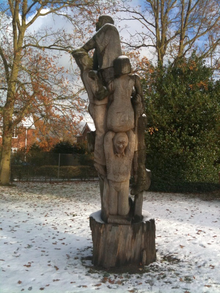Geoffrey Lister
Geoffrey Lister (also Litster or Litester ; † around June 26, 1381 at North Walsham ) was an English rebel. He was one of the leaders of the Peasants' Revolt in Norfolk, eastern England .
Geoffrey Lister was a relatively wealthy dyer from the village of Felmingham near North Walsham . He became the leader of the insurgents in east Norfolk after the Peasants' Revolt spread rapidly across Norfolk in mid-June. As early as June 17, he was the leader of a large number of insurgents who gathered at Mousehold Heath, outside Norwich , the seat of the bishop and the capital of Norfolk. Lister was supported by Sir Roger Bacon and Thomas Gissing , two dissatisfied members of the gentry . In Mousehold, the rebels murdered the justice of the peace Reginald Eccles , the knight Sir Robert Salle and John Newlyn , a serf of the Duke of Lancaster .
Then the rebels invaded Norwich, where they also occupied Norwich Castle . Lister had initially got the town's merchants on his side by assuring them that there would be no looting. Nevertheless, riots quickly broke out in the city, during which the nearby Carrow Abbey convent was looted. Lister then led the rebels to Yarmouth , where merchant houses were looted, tax collectors attacked and documents destroyed. Then Lister turned with his supporters to North Walsham , where they attacked Gimingham , an estate of the Duke of Lancaster.
Lister incited the rebels to attack monasteries and is believed to have tried to capture William de Ufford, 2nd Earl of Suffolk . However, he managed to escape, instead the rebels forced at least five knights and members of the gentry to join them. Lister is said to have called himself King of the Commons , but when he learned that the rebellion in London had been put down and their leader Wat Tyler had been killed on June 15, he wanted to start negotiations with the king. He sent two of the knights, accompanied by three confidants, to London to receive a pardon from the king, then he holed up with his followers in a fortified camp near North Walsham with a ditch and palisade. The delegates met at Newmarket on Henry Despenser , bishop of Norwich, who was an army to put down the rebellion on the way to Norwich. The bishop executed the three rebels and then moved with his troops to North Walsham, which he presumably reached on June 26th. The bishop's troops were able to storm the camp quickly, numerous rebels were killed or captured, and Lister was also taken prisoner. Bishop Despenser condemned him to death by hanging and beheading, going beyond his authority. The bishop himself confessed Lister and is said to have supported his head so that he would not hit the ground when Lister was dragged to execution.
Web links
- Andrew Prescott: Lister, Geoffrey (d.1381). In: Henry Colin Gray Matthew, Brian Harrison (Eds.): Oxford Dictionary of National Biography , from the earliest times to the year 2000 (ODNB). Oxford University Press, Oxford 2004, ISBN 0-19-861411-X , ( oxforddnb.com license required ), as of 2004
Individual evidence
- ^ Norwich Cathedral: Henry Despenser, the fighting Bishop. Retrieved August 26, 2015 .
- ^ North Walsham Town Council: North Walsham - Its origin and place in history. Retrieved September 1, 2015 .
| personal data | |
|---|---|
| SURNAME | Lister, Geoffrey |
| ALTERNATIVE NAMES | Litster, Geoffrey; Litester, Geoffrey |
| BRIEF DESCRIPTION | English rebel leader |
| DATE OF BIRTH | 14th Century |
| DATE OF DEATH | on June 26, 1381 |
| Place of death | at North Walsham |
